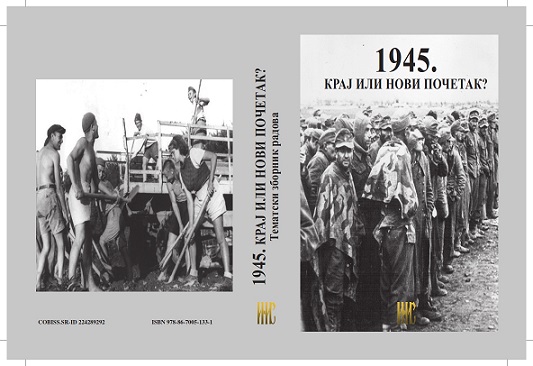Албански оружани отпор успостављању власти нoвe Југославије 1944-1945.
The Albanian Armed Resistance to the Establishment of the Authorities of the New Yugoslavia 1944-1945
Author(s): Dmitar Tasić
Subject(s): Civil Society, Military history, Political history, WW II and following years (1940 - 1949), History of Communism, Sociology of Politics
Published by: Institut za noviju istoriju Srbije
Keywords: Albanians; deserters; Federative People's Republic of Yugoslavia; Drenica rebellion; OZNA; Yugoslav Army; KNOJ;
Summary/Abstract: Temporary and partial realization of the Albanian national project took place during WWII when Albanian-inhabited Yugoslav territories were united with Albania under Italian auspices. This spurred a large number of Kosovo and Macedonian Albanians to side with the Axis Powers and to try to oppose the reestablishment of the pre-war order at the time these powers faced defeat. Their inclusion into the war effort started with liberation of Albanian-inhabited Kosovo and the Metohija, Western Macedonia and parts of Montenegro. This provoked passive and active resistance. Passive resistance took the form of evasion of military service and desertions, whereas the active one meant overt rebellion. Since a large number of Albanians had been included in some forms of military organization serving the occupiers and since large quantities of weapons were in the hands of the people and because the local Yugoslav authorities encouraged resistance by their actions, the Drenica rebellion flared up. The intensity and scope of the Albanian armed rebellion were a serious challenge to the Yugoslav leadership who was forced to redirect a certain number of military units to Kosovo from other fronts - particularly from the Syrmium-Front where decisive battles were in progress. The situation in 1945 was almost identical to the one in early 1920s as the power of the Kingdom of the Serbs, Croats and Slovenes had been established at the end of WWI. In 1945 the intensive armed clashes were followed by de-escalation and switching to individual actions and guerilla warfare, but also by transformation in the form of a political action.
Book: 1945. Kpaj или нови почетак?
- Page Range: 91-106
- Page Count: 16
- Publication Year: 2016
- Language: Serbian
- Content File-PDF

